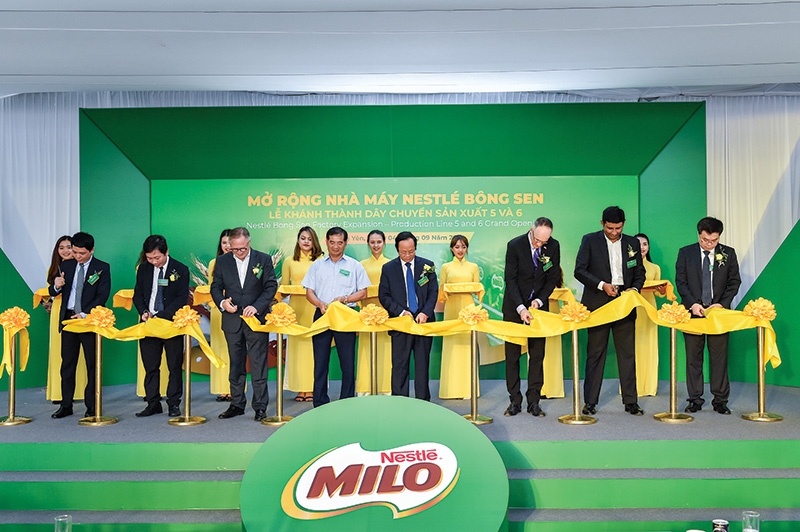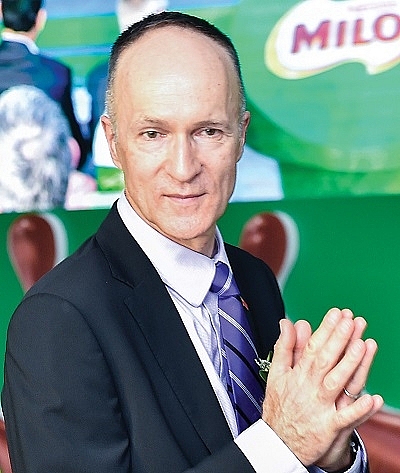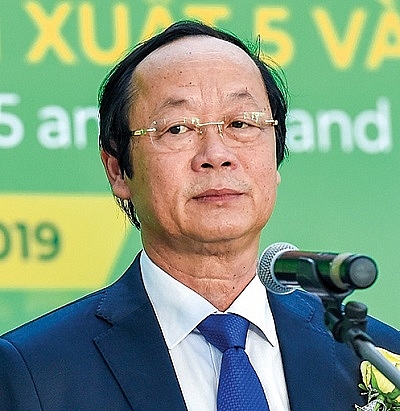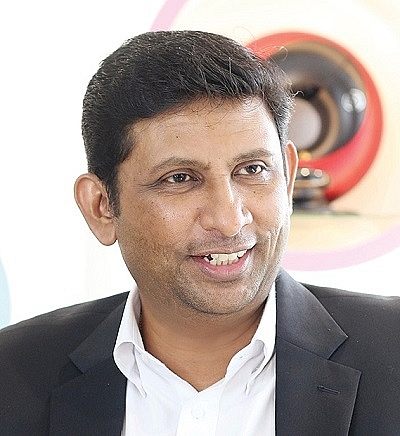Enriching Vietnam with Nestlé values
 |
| Nestlé has doubled the capacity of its Bong Sen factory in the northern province of Hung Yen |
With the opening of lines 5 and 6, the production capacity of Nestlé Bong Sen has been doubled in only two years. Nestlé Vietnam’s total investment in Hung Yen has also increased to some CHF107 million ($100 million). This demonstrates another important milestone in Nestlé’s ongoing mission to support the local economy and encourage sustainable development.
Swiss giant Nestlé operates six factories in Vietnam and two of these factories are now based in Hung Yen. As part of Nestlé Vietnam’s vision of continuous investments until 2025, the company set the goal to create 600 direct and thousands of indirect jobs for local people.
Specifically, Nestlé’s strong commitment to Hung Yen included not only the opening of Nestlé Bong Sen in May 2017, but also a distribution centre in March 2019 and now, in September, the doubling of the factory’s capacity. The expansion of Nestlé Bong Sen is a significant step in the organisation’s vision to enhance its leading position in nutrition, health, and wellness in the north of Vietnam.
Ganesan Ampalavanar, CEO of Nestlé Vietnam, said that Nestlé Bong Sen is a major expansion for Nestlé Vietnam that would increase the company’s footprint in North Vietnam. This, coupled with other factories in the southern province of Dong Nai, reflects Nestlé’s ambition to be a long-term development partner for Vietnam. “Indeed, Nestlé Vietnam has a vision to be a leading food and beverage company in the country by 2020. We are on track to be a major player in the field. As we grow further, we will contribute to the local community in Hung Yen by creating jobs as well as more investment in the future,” he said.
According to Ampalavanar, Nestlé’s values are rooted in respect. The company respects the country, the environment, and the surrounding community. The company always makes sure its products meet the highest safety and quality standards. All of Nestlé’s products in Vietnam are made for Vietnamese consumers – while meeting Nestlé’s global quality standards.
On the same note, Christian Schmid, head of Technical, Nestlé Zone AOA, shared in his opening remarks that Nestlé Vietnam has continuously invested in Hung Yen since the start of the project in 2016 and Nestlé Bong Sen is in many respects Nestlé World’s best performing ready-to-drink factory, in both operational and environmental measures, thanks to the solid business circumstances and tremendous passion and capabilities of the Vietnamese people.
“Quality and safety are Nestlé’s top priorities. This applies to all products worldwide, across all of our brands, from food and beverage to all of our systems and services. We are proud to continue to deliver delicious and nutritious Swiss-quality products to all consumers in Vietnam,” he added.
Established over 150 years ago, Nestlé is the world’s largest, most diversified food and beverage company which continuously aims to enhance quality of life and contribute to a healthier future. The group’s long-established vision, Creating Shared Value, is dedicated to a sustainable approach to environmental protection with renewable energy across all production sites, including Nestlé Bong Sen.
| David Best - Chargé d'affaires Embassy of Switzerland in Vietnam
The demand for the MILO drink, which is produced here, has been such that this factory had to double production capacity just to keep up. That is good news for Nestlé and for all those who crave malt-based drinks. I can certainly understand this very success. When I grew up in Switzerland, these beverages were very popular and we firmly believed in their performance-enhancing qualities ahead of school examinations and sports events. Vietnam has great potential, both as a business location and as a market for consumer products and services, as well as for investment goods. A few companies, including of course Nestlé, have been here for quite some time already. Today, more and more Swiss companies are coming to Vietnam. Some bring their products and services to Vietnam, while others set up operations to serve customers here and all around the world. About a hundred Swiss companies are already present in Vietnam today. Switzerland has become the fifth-largest European investor in Vietnam, ahead of many larger countries. These investments have created some 20,000 jobs in various sectors, including engineering, pharmaceuticals, and food processing, where Nestlé is the leading investor and employer. Vo Tuan Nhan - Deputy Minister of Natural Resources and Environment
Nestlé is a large corporation from Switzerland with a history of more than 150 years. The group operates many factories worldwide, providing numerous nutrient food products and beverages. In addition, Nestlé is a proactive member in many coalitions and joint-hand initiatives towards environmental protection globally, such as the Global Anti-Plastic Group or 2030 Water Resources Group. In Vietnam, Nestlé commits to sustainable long-term investment with a total of six factories and increasing investment to around $600 million at the moment. The company was named among the 100 biggest corporate taxpayers in Vietnam by the General Tax Department. More importantly, Nestlé’s factories always pioneer environmental protection activities, sustainable development, and the application of environmentally friendly technologies. After three years of operation, we are very happy to attend the inauguration of the expanded Nestlé Bong Sen Factory today. This is the sixth factory of the group and the second factory in Hung Yen with the total investment of more than $100 million. I hope that Nestlé Vietnam and Nestlé Bong Sen will always comply with Vietnam’s laws and regulations on business operation and environmental protection, take good care of your employees, and will continue to contribute to social activities, contributing to a Green – Clean – Sustainable Vietnam. Ganesan Ampalavanar - CEO Nestlé Vietnam
We are committed to a green and clean Vietnam. All of our factories have achieved the “Zero Waste to Landfill” goal. That means nothing that leaves our factories will go to the landfill. In this process, Nestlé also applied initiatives such as using coffee husk as fuel, ash as fertiliser, waste from the boiler in the production process to make bricks, and processing wastewater for watering, among others. We have joined the Packaging Recycling Organization Vietnam (PRO Vietnam) coalition to support the growth of a strong, resilient domestic packaging collection and recycling ecosystem. The packaging process in our factories also meets our global standards. However, to fully drive the circular economy, Nestlé’s efforts are not enough, we also need consumers who use our products. We need to learn how to reduce littering and encourage collection and recycling. We have also committed that all our packaging materials shall be collected for recycling by 2025. To facilitate this goal, we help everybody collect and send the old packages to recycling centres. La Vie Vietnam, also part of Nestlé, has committed to buying recycled plastics in order to create a market for whoever recycles and collects. Even though the recycled materials are more expensive, we believe this will raise awareness about the value of collecting and recycling. |
What the stars mean:
★ Poor ★ ★ Promising ★★★ Good ★★★★ Very good ★★★★★ Exceptional
Related Contents
Latest News
More News
- Kurz Vietnam expands Gia Lai factory (February 27, 2026 | 16:37)
- SK Innovation-led consortium wins $2.3 billion LNG project in Nghe An (February 25, 2026 | 07:56)
- THACO opens $70 million manufacturing complex in Danang (February 25, 2026 | 07:54)
- Phu Quoc International Airport expansion approved to meet rising demand (February 24, 2026 | 10:00)
- Bac Giang International Logistics Centre faces land clearance barrier (February 24, 2026 | 08:00)
- Bright prospects abound in European investment (February 19, 2026 | 20:27)
- Internal strengths attest to commitment to progress (February 19, 2026 | 20:13)
- Vietnam, New Zealand seek level-up in ties (February 19, 2026 | 18:06)
- Untapped potential in relations with Indonesia (February 19, 2026 | 17:56)
- German strengths match Vietnamese aspirations (February 19, 2026 | 17:40)




 Tag:
Tag:



















 Mobile Version
Mobile Version